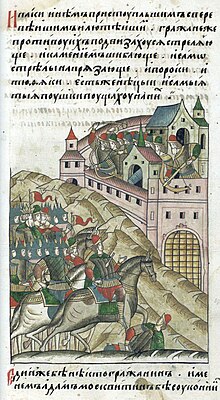Toctamic
Toktamisch , also Tochtamisch , Toqtamisch or Toqtamiš († 1406/1407 in the Tyumen area ) was a descendant of Genghis Khan and a Khan of the Golden Horde . He ruled from around 1380 to 1395. Toktamish probably came from the family of Tuqa Timur .
Life
Toktamisch came to power after several fights against his uncle Urus Khan († 1376) and his sons in Siberia around 1376-78 and was appointed Khan in Signaq . Urus had been the Khan of the Orda Horde and could only be brought into distress with considerable support from Central Asia's conqueror, Timur Leng . It was only Urus' sudden death and the succession of his weak sons that Toktamish paved the way.
In 1380 Toktamisch eliminated the Emir Mamai , who had been discredited by the defeat of Kulikowo, and reunited the Golden Horde around Sarai . Then he restored the sovereignty of the "Mongols" in Russia, with Moscow being sacked in 1382 . At that time only a few thousand native Mongols served in his army, the majority of whom were members of Turkish tribes.
Toktamisch inevitably came into conflict with his former patron Timur Leng and was defeated for the first time on April 14, 1391 near Samara in the Volga region. But Timur Leng didn't take advantage of his win. In this way Toktamisch was able to regain control and Timur Leng had to take to the field a second time. This time, after his hard-won victory on Terek (April 14, 1395) , Timur destroyed all the cities of the Golden Horde, including Sarai, so that the state could no longer recover.
Toktamisch fled to Lithuania and tried, with the help of the local Prince Witold , to regain power in the Golden Horde. However, the Alliance suffered a defeat in the Battle of the Worskla in 1399 against the Emir Edigü , the new strongman of the Horde. Toktamish fled to the Siberian Khanate ; there the processes were repeated and he was killed in the winter of 1406/07 by Edigu's protégé Schadi Beg .
After Toktamish's death, his sons continued to fight for the throne of the Golden Horde with Lithuanian support. These are the princes Gelal-ed-Din (1412), Kebek (1414-1415, 1422), Kerim Berdi (1412-1417), Gabbar Berdi (1417) and Kadir Berdi (1419).
Remarks
- ↑ In Abu'l-Ghazi the line of ancestry is: Dschötschi - Tuqa Timur - Uz Timur - Saricha (-) Kunchak Oghlan - Tokul Khoja Oghlan - Tuli Khoja - Toktamish. An origin from the Ordas family is also possible . See Howorth: History of the Mongols, p. 226; Safargaliev: Raspad Zolotoj Ordy, attached; Spuler: Golden Horde, p. 120.
- ^ Jürgen Paul: Central Asia. 2012, p. 241
- ↑ James Forsyth: A History of the Peoples of Siberia. Russia's North Asian Colony. 1581-1990. , P. 25
literature
- Bertold Spuler : The Mongolian Empire, Vol. 2: The Golden Horde. The Mongols in Russia 1223–1502 . Harrassowitz Verlag, Wiesbaden 1965 (reprint of the Leipzig edition 1943).
- Tilman Nagel : Timur the Conqueror and the Islamic World of the Late Middle Ages . Beck Verlag, Munich 1993, ISBN 3-406-37171-X .
- Henry Hoyle Howorth: History of the Mongols from the 9th to the 19th Century, Vol. 2: The So-Called Tartars of Russia and Central Asia . Franklin Press, New York 1972 (reprint of the London 1880 edition).
- Jürgen Paul : Central Asia . Frankfurt am Main 2012 ( New Fischer World History , Volume 10).
- James Forsyth: A History of Peoples of Siberia: Russia's North Asian Colony, 1581-1990 . Cambridge University Press, Cambridge 1992, ISBN 0-521-47771-9 , pp. 25th f . (English, limited preview in Google Book Search [accessed June 20, 2020]).
| predecessor | Office | successor |
|---|---|---|
| Mamai , emir |
Khan of the Golden Horde 1380–1395 |
Edigü , Emir |
| personal data | |
|---|---|
| SURNAME | Toctamic |
| ALTERNATIVE NAMES | Toqtamian |
| BRIEF DESCRIPTION | Khan of the Golden Horde |
| DATE OF BIRTH | 14th Century |
| DATE OF DEATH | 1406 or 1407 |
| Place of death | near Tyumen |
